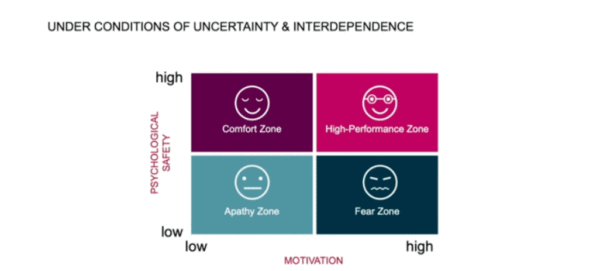4Feb2022
What is psychological safety and why is it such a topical matter for organizations today? Amy Edmondson, the #1 management thinker and Harvard professor is a pioneer in the topic. Based on our earlier masterclass with Amy, we here give you an introduction to the basics of psychological safety.
Why Fear Fails
Ever heard of management by fear? According to Amy fear might have worked as a motivator in the past. To demonstrate that she gave an example of the classic automobile company Ford. Back in its early days, fear was a leadership tool as work was standardized, individual, and objective; it was easy to spot if someone didn’t do his or her part.
“Today, we are far more likely to have work that requires judgment, collaboration, and coordination. The quality of that work is at least partly subjective and may take some time.” This type of work is far harder to lead and motivate through fear. “I suggest that fear fails for most of us in the work we do in a modern organization”.
Why Psychological Safety Matters
The world we live in today is volatile, uncertain, complex, and ambiguous. Amy refers to this as the VUCA world and recommends we finally start taking this seriously. By acknowledging the fact that the environment in which we operate can be described with these 4 words, we internalize the idea that “anyone’s voice can be mission-critical”.
Fear often stops people from voicing their ideas and opinions. No one wants to look ignorant, incompetent, intrusive, or negative. The way we avoid looking that way is by not asking questions, by not admitting our weaknesses or mistakes, and by not offering our ideas. That’s when the company’s learning, innovation, and progress are at risk.
The consequences of people not voicing their thoughts not only hold the company back from innovation and progress. It can also, in some cases, be disastrous for the organization. But naturally, it’s not always that something critical happens if people don’t speak up. However, what Amy highlighted is that even those times when nothing happens, the person who withholds his or her opinions and ideas, starts to disengage. So, in the long run, that becomes a problem too.
What Is Psychological Safety?
“Psychological safety is not a function of organizational culture.” Why? Amy stated that studies have shown that psychological safety varies between teams in the same organization. So, the bad news about this fact is that it is very hard for any company to simply decide to have psychological safety in their entire organization. “But the good news is that wherever you work, you have the opportunity to create psychological safety in your team.”
To take a step back, Amy still wanted to define what psychological safety actually means as sometimes people understand it the wrong way. According to Amy, psychological safety is “a belief that the context is safe for interpersonal risk-taking – that speaking up with ideas, questions, concerns, or mistakes will be welcomed and valued”.
Psychological safety is not about being nice, a guarantee that all your ideas will be applauded, freedom from conflict, permission to slack off, or the goal. Amy underlined that indeed the goal can be anything from innovation to high performance, and psychological safety is a necessary means to reach that goal.
Psychologically Safe Employees Are Engaged Employees
Next, to dive a little deeper, Amy listed 4 dimensions of psychological safety. Psychological safety consists of beliefs about:
- Inclusion and diversity. When team members see the team as inclusive, they are more inclined to speak up and contribute to the work.
- Willingness to help. When team members see each other as willing to help, they will speak up when they are unsure about something.
- Attitude to risk and failure. When team members believe the team blames people for mistakes, they will not try new things or report problems.
- Open conversation. When team members believe that open and candid conversations are possible, they tackle hard problems together.
Amy underlined that through psychological safety organizations can reach high performance. “But it’s not enough. Psychological safety needs to coexist with motivational drivers.” In order to reach high performance, employees need to find passion, purpose, get feedback, etc. She demonstrated this through the table below.

“In the VUCA world, without both motivation and psychological safety it’s pretty hard to achieve high performance. You need both.”
Amy Edmondson will join us in Helsinki next September to talk more about psychological safety and how to create a fearless organization. If you want to learn more from Amy, the #1 Management Thinker in the world, get your access to the Nordic Business Forum 2022.

 by:
by: 
